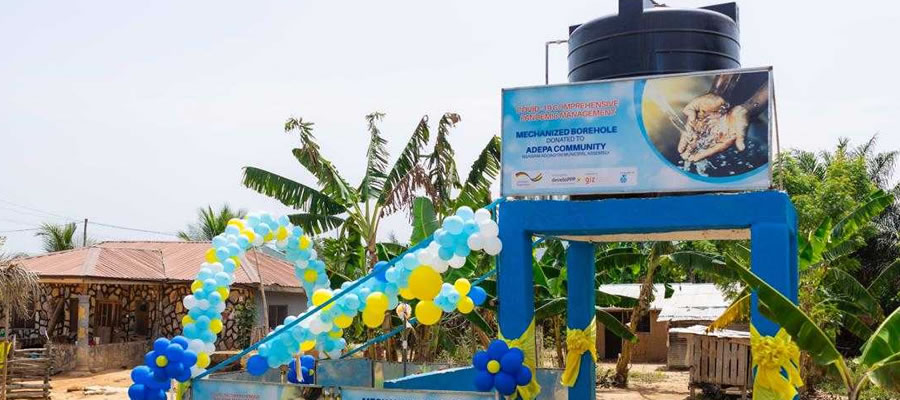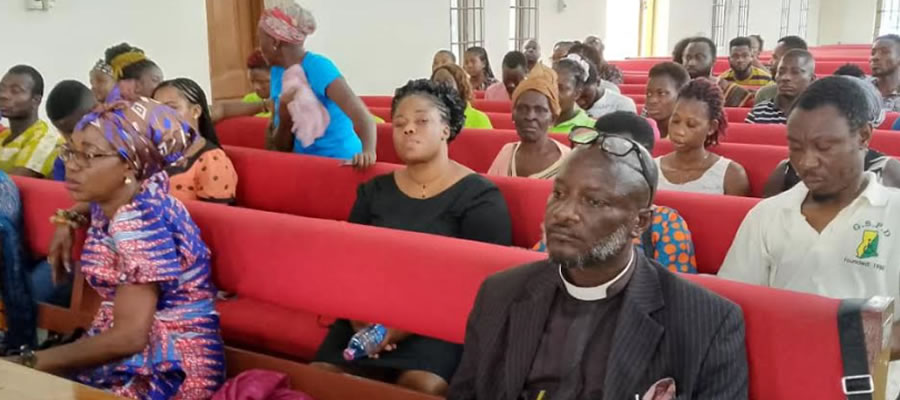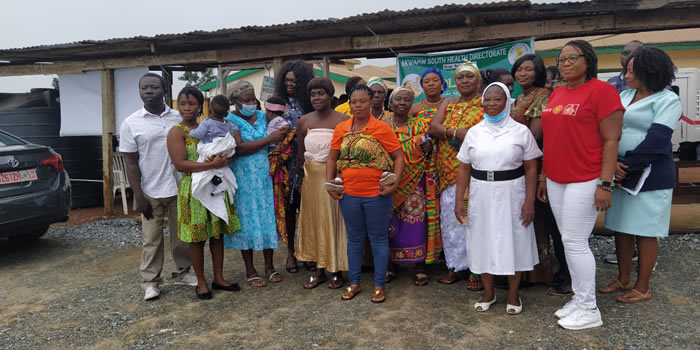

Health Service Delivery
Health Infrastructure
The Health service providers in the district consist of public, private and NGOs whose services are complemented by Traditional Birth Attendants (TBAs) and Community-Based Surveillance Volunteers (CBSVs). Majority of these traditional health practitioners remain unregistered and operate especially within the rural communities in the district. The various levels of health service delivery existing currently are:
i. Four Health centres at Pokrom, Pakro, Berekuso and Obetwere
ii. 54 active Volunteers
iii. 4 Number NGOs
iv. 24 Chemical Shops
v. 18 Traditional Healers
vi. 24 CHPS Centres
vii. 2 Private Clinics
In addition to the aforementioned facilities, Tetteh Quarshie Government and Nsawam Government hospitals in the Akwapim North and Nsawam Adoagyiri municipalities respectively provide further advanced and specialized services to residents of the district since the district lacks any hospital.
Figure 5: Health Facilities Map
Top ten diseases
Malaria continues to be the topmost diseases that the affect majority of the people in the district. Malaria trend has been increasing over the years ranging from 8,281 cases in 2014 to 14,279 cases in 2016. In the light of the above, the district has embarked on a number of programmes such as distribution of LLTN, mass spraying of drains and gutters and malaria sensitization programmes to curb the menace. The broad spectrum of the top ten diseases in the district from 2014 to 2017 is presented in the table below;
Most clients (89%) reporting to the health facilities as at march, 2017 are on the NHIS compared with only 11% who reported as non-insured clients. This implies that the district has significantly increased its coverage onto the scheme from below 56% in 2014 to the current level. Efforts should however, be put in place to ensure 100% coverage in the district.
Females form the majority of (61%) of clients attending health facilities in the district as compared with males with 39%. However, OPD per capita reduced from 0.32 in 2015 to 0.30 in 2016; implying clients’ decision to access professional service when sick has reduced by 0.02.
District Health Staff Strength
The Health staffing position in the district currently is 114 comprising of both technical and administrative officers.
The table below shows the details of the staff strength in the district.
Maternal Mortality and Death
The District recorded no maternal death throughout the planned period (2014-2017). This was because the Assembly and the Health Directorate put in measures such as campaign on no maternal death in the district for the plan period of implementation in collaboration with various stakeholders including the Christian Council, Traditional Authorities, Civil Society among others.
Family Planning
Family Planning services are provided at all the health facilities in the District to assist couples in their reproductive stages. These services are designed to prevent unplanned pregnancies, space births, treat infertility and improve reproductive health. Some of the family methods and/or services available to the people include condom use, oral pills, injectables, IUD and Norplant, as well as natural family planning methods. There is a reduction in Copper T and Jadelle in the period under review. The increase in CYP for Depo Provera and Norigynon is as a result of clients shifting from Copper T and Jadelle usage.
HIV and AIDs
The Akwapim South District recorded a total of 93 cases of HIV/AIDS from 2014-2017. The rate of infection has over the years witnessed a steady increase from 18 cases in 2014 to 53 cases in 2016.
Over the years, there were a series of preventive education on HIV and HCT in the District. A total of 8,400 male condoms and 466 female condoms were also distributed in 2016. Besides the preventive education, anti-stigma discrimination messages were carried out in all basic schools in the District.
Screening of blood before transfusion, safe injection, voluntary counselling and testing were also amongst the strategies to help reduce the incidence.
Challenges of Health Service Delivery in the District
• Inadequate skilled staff – doctors, nurses, laboratory technicians etc.
• Inadequate infrastructure e.g. Nurses quarters, CHPS Centres
• High rate of malaria
• Lack of hospital
• Inadequate logistics
Date Created : 11/23/2017 2:42:44 AM











 facebook
facebook
 X
X
 Youtube
Youtube
 instagram
instagram
 +233 593 831 280
+233 593 831 280 0800 430 430
0800 430 430 GPS: GE-231-4383
GPS: GE-231-4383 info@ghanadistricts.com
info@ghanadistricts.com Box GP1044, Accra, Ghana
Box GP1044, Accra, Ghana